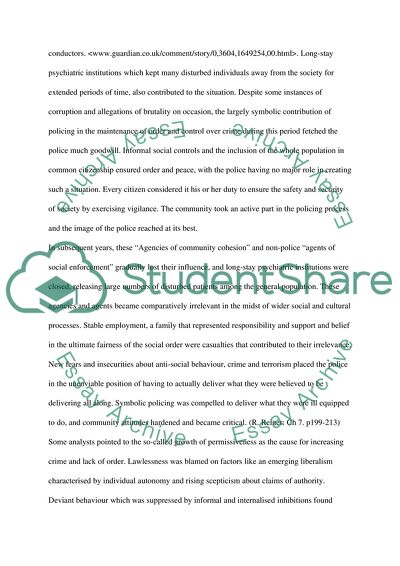
- Home
- Free Samples
- Premium Essays
- Editing Services
- Extra Tools
- Essay Writing Help
- About Us
- Studentshare
- Subjects
- Miscellaneous
- Attitudes to the police have changed significantly since the so-called golden age of consensus policing. What are the factors that have contributed to this c
Attitudes to the police have changed significantly since the so-called golden age of consensus policing. What are the factors that have contributed to this c - Essay Example

- Subject: Miscellaneous
- Type: Essay
- Level: Undergraduate
- Pages: 4 (1000 words)
- Downloads: 0
- Author: hilpertjackie
Extract of sample "Attitudes to the police have changed significantly since the so-called golden age of consensus policing. What are the factors that have contributed to this c"
Direct confrontation between the police and radical elements in the community has always occurred, but by and large the role of the police has been one of law enforcement and prevention of petty crime. When the gap between expectations and perceived performance widens or the activities of radical fringes of the population crosses accepted limits, conflict arises, and attitudes harden. This phenomenon is becoming increasingly common. The attitude of the public towards the police has undergone a sea change during the 20th century.
This change in attitude became more pronounced between the periods before and after the 40’s and 50’s in particular. This transformation has been the consequence of a variety of reasons arising from evolution of new policing policies, community expectations about the nature and effects of policing and the new challenges that police forces face. The 40s and 50s were considered a “golden age” as far as attitudes towards the police was concerned. The nature of policing was described as consensus policing, and during this period the police was able to maintain order and effectively check crime, with most of the credit going to the police.
“Agencies of community cohesion like churches, trade unions and housing associations” had an important part to play during this period, as also the role played by non-police “agents of social enforcement” like park-keepers, caretakers and bus conductors. . Long-stay psychiatric institutions which kept many disturbed individuals away from the society for extended periods of time, also contributed to the situation. Despite some instances of corruption and allegations of brutality on occasion, the largely symbolic contribution of policing in the maintenance of order and control over crime during this period fetched the police much goodwill.
Informal social controls and the inclusion of the whole
...Download file to see next pages Read More
- TERMS & CONDITIONS
- PRIVACY POLICY
- COOKIES POLICY